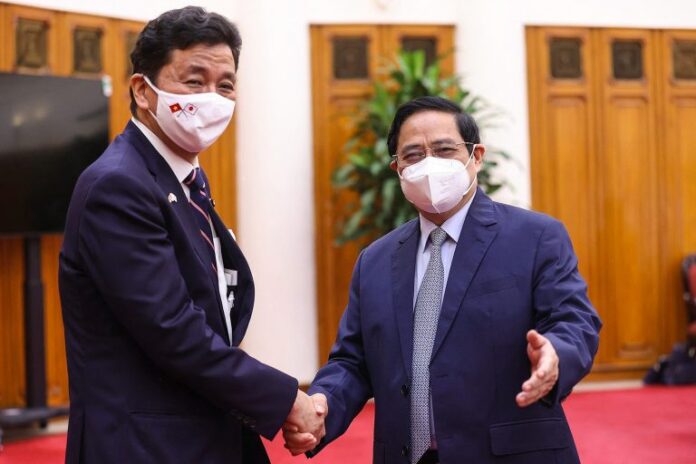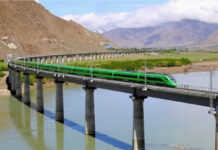In recent times, Vietnam has emerged as the darling of the world. Many important countries such as the US, Japan, India and many European countries are making special efforts to court Vietnam. Why is there this sudden recognition of Vietnam and why does Vietnam qualify for such an honour? There are valid reasons for this. Each country making special effort to woo Vietnam finds matching interests between the two countries. The factors for such bonhomie range from economic to strategic/security considerations with cultural background underpinning and providing additional heft. For example, while economic interests bind Vietnam and China together despite the latter’s bullying behaviour on territorial issues, security considerations and shared values bring Vietnam closer towards Japan, India and the US. It should also not be forgotten that Vietnam is the fastest growing economy in the ASEAN grouping.
By Prof Rajaram Panda
Against this background, what significance emerges from the two-day visit of Japan’s Defence Minister Nobuo Kishi to Vietnam from 11-12 September 2021? This analysis tries to situate Japan-Vietnam relations in the regional context. The visit assumes additional significance at a time when Japan’s Yoshihide Suga withdrew from the LDP presidential election due on 29 September thus paving the way for a new Prime Minister on 30 September. Also, despite the fact that days later he shall relinquish office, Suga shall travel to Washington to participate in the first Quad summit meeting in physical mode on 24 September being hosted by the US President Joe Biden. So the momentum is being maintained. Two weeks ago, the US Vice President Kamala Harris became the first sitting Vice President to visit Vietnam with a view to deepen strategic ties with the Southeast Asian nation. Harris had urged countries to stand up against “bullying” by China in the South China Sea.
The major highlight of Kishi’s visit was a demonstration of Japan seeking to ease military restrictions through defence deal with Vietnam. Both countries signed an agreement on the transfer of defence equipment and technology in a clear move to cope with the China challenge. The agreement was reached at a meeting between Nobuo Kishi and his Vietnamese counterpart Phan Van Giang. Interestingly, Kishi’s visit coincided with the two-day visit of Chinese State Councillor and Foreign Minister Wang Yi. This indicates that Hanoi is carefully navigating its foreign policy by balancing China with other friendly countries through defence and military cooperation. By military cooperation with Vietnam, Japan wants to expand its influence and strategic footprint and the equipment exports are therefore an effort to ease Japan’s military limit. In subsequent talks, both sides shall work out the details of the transfer of specific equipment, including naval vessels. Japan is now poised to sell SDF vessels if subsequent talks progress on expected lines. This defence deal is also indicative of Japan’s long-term aim to project power in the Indo-Pacific region’s security issues, with Vietnam as the lynchpin of the ASEAN grouping. This also means an extension and endorsement of former Prime Minister Shinzo Abe’s aim to get rid of military restrictions, thereby boosting Japan’s military role overseas. That the Japan-Vietnam military deal is aimed at China’s rising assertiveness in regional waters cannot be ignored. With this deal for sale of defence equipment, the partnership between Japan and Vietnam is elevated “to a new level” as both resolve to deepen defence ties through multilateral joint exercises and other means.
China’s emergence as a threatening power has unnerved the smaller neighbouring countries. Since no single country in Asia is capable of coping with China’s might, it is inevitable that like-minded countries with shared values facing China’s wrath come together to discuss, debate and coordinate policies so that they can take a common stand to deal with China.
As regards Japan, its mention of Taiwan in the Defence White Paper 2021 made Beijing furious. Further Japan’s Deputy Minister for Defence Yasuhide Nakayama linking Chinese attack on Taiwan having direct bearing on Japan’s own security further infuriated Beijing. Taiwan and the South China Sea are the two potential flashpoints that could adversely impact on the security of the region. Despite Beijing’s belligerence, Wang Yi tried to sooth tempers by emphasising while in Hanoi that both China and Vietnam must abide by the political consensus reached over the South China Sea issue and avoid any unilateral measures that may complicate the situation and escalate disputes. The irony is that the definition of ‘political consensus’ is only China-centric and according to its own interpretation with no consideration of others’ opinions.
The major import of the pact was that both sides agreed on the importance of maintaining freedom of navigation and overflight in the Indo-Pacific region, as well as cooperation in various defence areas including cyber security. Tokyo is upset that Chinese coast guard vessels making frequent forays near the Japanese-controlled Senkaku islands, which China also claims and calls Diaoyu. Chinese vessels routinely violate Japanese territorial waters around the islands, sometimes threatening fishing boats. No wonder, if Beijing ever makes any unilateral attempt to change the status quo by coercion or any activities, it would inevitably escalate tensions. Incidentally, Vietnam is the 11th nation with which Japan has signed a defence equipment and technology transfer deal. Other countries with which Japan has signed similar agreements are Britain, Australia, the Philippines and Indonesia.
It was apt therefore when Kishi remarked that Japan and Vietnam are in the same boat amid China’s rise and that both share the same destiny amid China’s increasingly assertive maritime activity. Not only for Vietnam but also for other Asian nations having territorial disputes with China over the Spratly and Paracel Island groups, where Beijing is accused of militarizing outposts that it has constructed are worrying.
Indeed, the Party, State, Government and people of Vietnam accept Japan as one of the partners of top importance which enjoys a high trust in the country’s foreign policy, as observed by Prime Minister Pham Minh Chinh. The Prime Minister was grateful to Japan for providing Vietnam with over 3 million doses of vaccines against the COVID-19 pandemic and facilitating Vietnamese working and living in Japan and asked Japan to help Vietnam with vaccines. Chinh urged Japan to continue providing Vietnam with new ODA projects, and pledged that Vietnam will continue to create a transparent and favourable environment for investment by foreign countries, including Japanese ones.
Chinh and Kishi shared similar viewpoints on maintaining peace, stability, security, safety and freedom of navigation and aviation, settling disputes and differences in the sea by peaceful measures on the basis of respect to international law, including the United Nations Convention on the Law of the Sea in 1982. Other issues that figured in the discussion between the two leaders included the need for denuclearisation of the Korean Peninsula and ASEAN’s efforts to find a solution to the issue of Myanmar after military takeover on 1 February 2021.
Besides the Taiwan issue, the South China Sea is the much contested one because of its huge strategic importance. These two issues are driving nations in the Indo-Pacific region to sculpt partnership to workout measures in the interest of peace and stability. The bilateral and multilateral naval exercises, sharing of military and sensitive equipment and information, frequent mutual visits of top leaders to keep the momentum going and many more are all aimed to maintain peace and stability and prevent any unilateral action by a single power to disturb the status quo. Kishi’s visit to Hanoi too should be seen from this perspective. As was the case with former Prime Minister Abe and his successor Suga who choose Vietnam as their first destination after coming to power, so was Kishi after he became the Defence Minister. The significance of this single factor cannot be overlooked in assessing how Japan-Vietnam ties are evolving. Each of these visits has contributed to a substantive progress in the extensive strategic partnership between the two countries.
When Suga chose Vietnam for his first overseas visit in 2020, the background preparation was already made for the agreement on military equipment and technology sale, which was clinched during Kishi’s visit. In view of the sensitivity of the issue, there was no direct reference to China but the import was all clear for all to see. As expected, Beijing got the message and is expected to adopt countermeasures. For its part, Beijing too is trying to wean Vietnam away from this strategic ‘trap’ to minimise its own worries, also by indulging in vaccine diplomacy. But with larger strategic issues centring on Vietnam’s sovereignty in place, if Beijing believes that Vietnam could be enticed by its vaccine diplomacy and bring into its fold then it would be a misreading of Vietnam’s policy objectives. Unless Beijing changes course and adopts more accommodative approach, Japan-Vietnam relations will become more robust.
This article first appeared in www.vifindia.org and it belongs to them.








